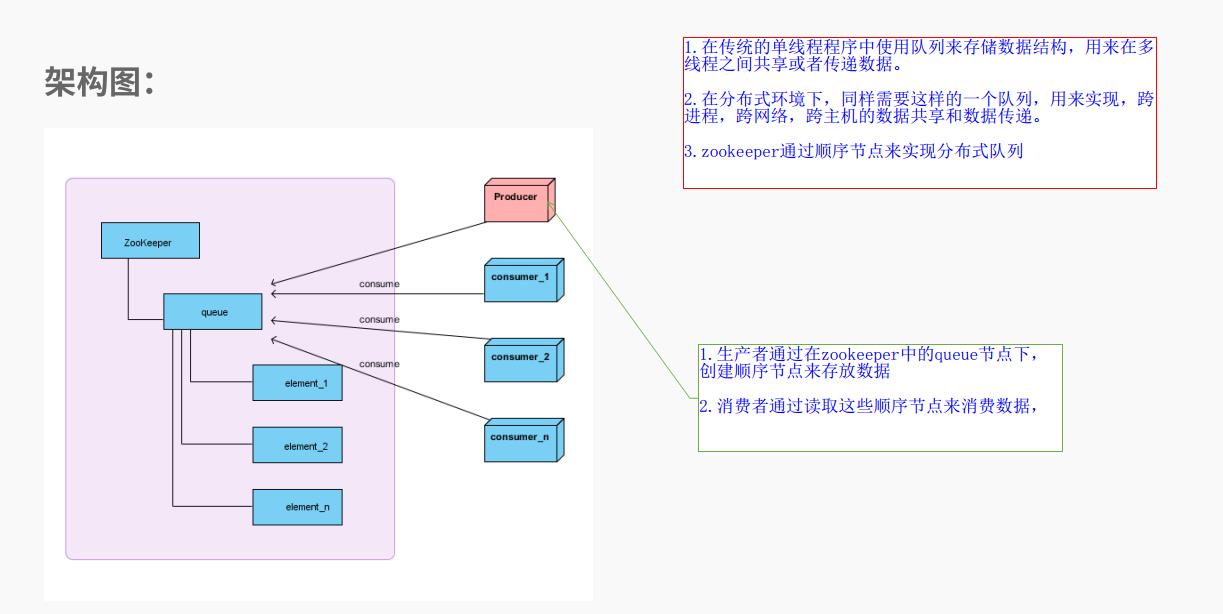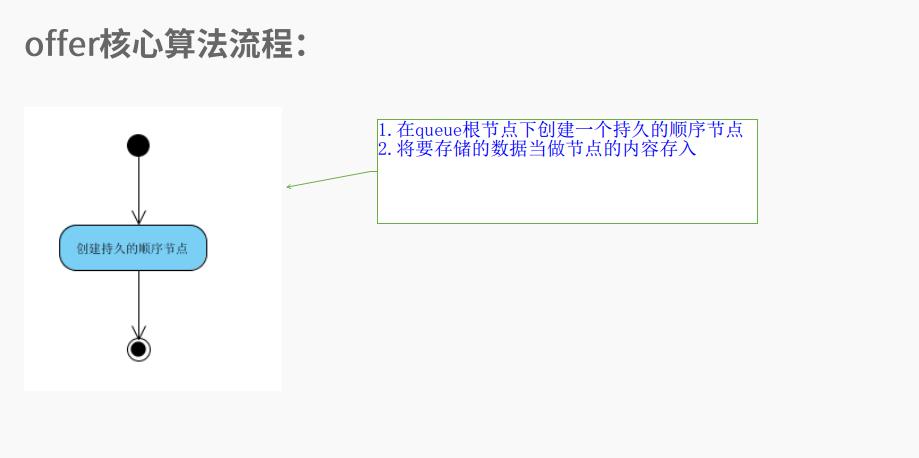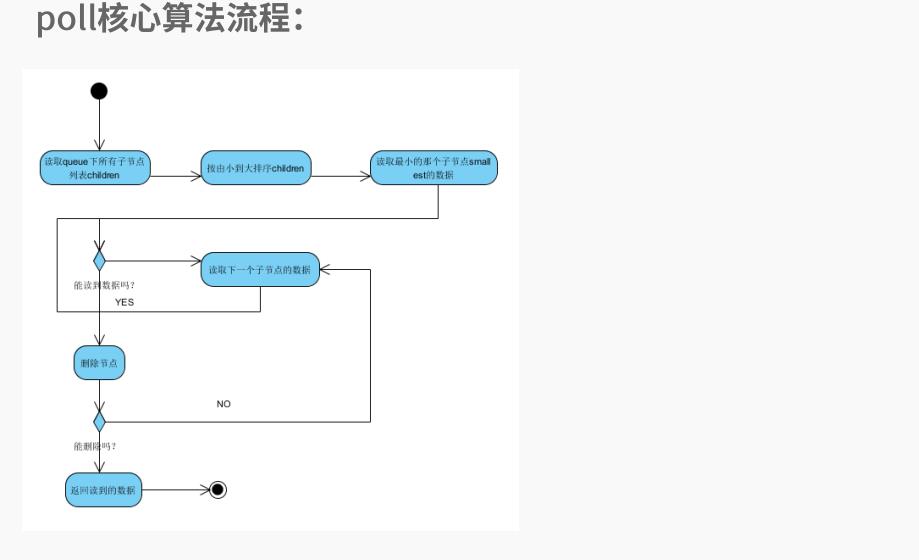1.分布式队列的架构
2.向队列中提交数据流程
3.从队列中取数据流程
队列的组成
package com.jike.queue;
import java.util.Collections;
import java.util.Comparator;
import java.util.List;
import org.I0Itec.zkclient.ExceptionUtil;
import org.I0Itec.zkclient.ZkClient;
import org.I0Itec.zkclient.exception.ZkNoNodeException;
public class DistributedSimpleQueue<T> {
protected final ZkClient zkClient;//用于操作zookeeper集群
protected final String root;//代表根节点
protected static final String Node_NAME = "n_";//顺序节点的名称
public DistributedSimpleQueue(ZkClient zkClient, String root) {
this.zkClient = zkClient;
this.root = root;
}
//获取队列的大小
public int size() {
/**
* 通过获取根节点下的子节点列表
*/
return zkClient.getChildren(root).size();
}
//判断队列是否为空
public boolean isEmpty() {
return zkClient.getChildren(root).size() == 0;
}
/**
* 向队列提供数据
* @param element
* @return
* @throws Exception
*/
public boolean offer(T element) throws Exception{
//构建数据节点的完整路径
String nodeFullPath = root .concat( "/" ).concat( Node_NAME );
try {
//创建持久的节点,写入数据
zkClient.createPersistentSequential(nodeFullPath , element);
}catch (ZkNoNodeException e) {
zkClient.createPersistent(root);
offer(element);
} catch (Exception e) {
throw ExceptionUtil.convertToRuntimeException(e);
}
return true;
}
//从队列取数据
@SuppressWarnings("unchecked")
public T poll() throws Exception {
try {
List<String> list = zkClient.getChildren(root);
if (list.size() == 0) {
return null;
}
//将队列安装由小到大的顺序排序
Collections.sort(list, new Comparator<String>() {
public int compare(String lhs, String rhs) {
return getNodeNumber(lhs, Node_NAME).compareTo(getNodeNumber(rhs, Node_NAME));
}
});
/**
* 将队列中的元素做循环,然后构建完整的路径,在通过这个路径去读取数据
*/
for ( String nodeName : list ){
String nodeFullPath = root.concat("/").concat(nodeName);
try {
T node = (T) zkClient.readData(nodeFullPath);
zkClient.delete(nodeFullPath);
return node;
} catch (ZkNoNodeException e) {
// ignore
}
}
return null;
} catch (Exception e) {
throw ExceptionUtil.convertToRuntimeException(e);
}
}
private String getNodeNumber(String str, String nodeName) {
int index = str.lastIndexOf(nodeName);
if (index >= 0) {
index += Node_NAME.length();
return index <= str.length() ? str.substring(index) : "";
}
return str;
}
}
发送的消息对象封装
package com.jike.queue;
import java.io.Serializable;
public class User implements Serializable {
String name;
String id;
public String getName() {
return name;
}
public void setName(String name) {
this.name = name;
}
public String getId() {
return id;
}
public void setId(String id) {
this.id = id;
}
}
Zookeeper构建分布式队列测试
package com.jike.queue;
import org.I0Itec.zkclient.ZkClient;
import org.I0Itec.zkclient.serialize.SerializableSerializer;
public class TestDistributedSimpleQueue {
public static void main(String[] args) {
ZkClient zkClient = new ZkClient("192.168.1.105:2181", 5000, 5000, new SerializableSerializer());
DistributedSimpleQueue<User> queue = new DistributedSimpleQueue<User>(zkClient,"/Queue");
User user1 = new User();
user1.setId("1");
user1.setName("xiao wang");
User user2 = new User();
user2.setId("2");
user2.setName("xiao wang");
try {
queue.offer(user1);
queue.offer(user2);
User u1 = (User) queue.poll();
User u2 = (User) queue.poll();
if (user1.getId().equals(u1.getId()) && user2.getId().equals(u2.getId())){
System.out.println("Success!");
}
} catch (Exception e) {
e.printStackTrace();
}
}
}





 本文详细介绍了分布式队列的架构,包括如何向队列中提交数据和从队列中取出数据的流程。通过使用Zookeeper作为底层存储,实现了队列的分布式特性。文章最后通过一个简单的例子演示了如何在实际场景中应用这一技术。
本文详细介绍了分布式队列的架构,包括如何向队列中提交数据和从队列中取出数据的流程。通过使用Zookeeper作为底层存储,实现了队列的分布式特性。文章最后通过一个简单的例子演示了如何在实际场景中应用这一技术。



















 956
956

 被折叠的 条评论
为什么被折叠?
被折叠的 条评论
为什么被折叠?








